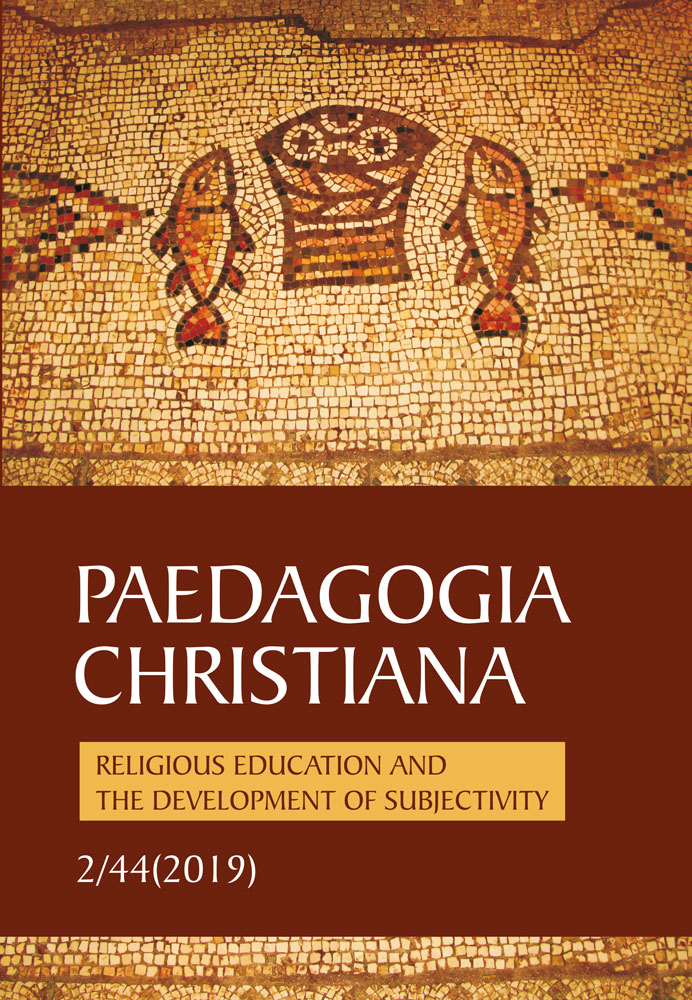Subjective Biblical Discourse as the Basis of Education for Relationships. Discursive Interpretation Supplementing the Theological Synthesis
DOI:
https://doi.org/10.12775/PCh.2019.040Keywords
biblical discourse, subjective discourse, discursive analysis, education for relationshipsAbstract
The Bible is a collection of texts, which in the tradition of the Church is read as an expression of divine pedagogy or the art of God’s educational influence on humankind. Developed moral principles that refer to the Bible were of a synthetic nature. Contemporary research manifests the underestimated, discursive dimension of the biblical text, which calls for a new approach to the interpretation of the biblical message. A specific process in the formation of the written biblical tradition had an impact on the discursive nature of biblical texts. Indeed, discursive analysis and interpretation is a response to the discursive nature of said texts. Biblical discourse is often inscribed in biblical narratives. Among them, the key discourse is the subjective discourse, whose discursive partner is God himself (Jesus). They touch upon timeless problems and play an important educational role. Subjective discourse in the Bible constitutes a didactic tool for education for relationships. The article contains a brief description of selected types of subjective discourse explored from the educational perspective.
References
Bagrowicz, Jerzy, Stanisław Jankowski. “Pan, Bóg twój, wychowuje ciebie” (Pwt 8, 5). Studia z pedagogii biblijnej. Toruń: Wydawnictwo Naukowe Uniwersytetu Mikołaja Kopernika, 2005.
Bernstein, Moshe J. “Rewritten Bible. A Generic Category Which Has Outlived its Usefulness?”. Textus 22 (2005): 169–196.
Carr, David. The Formation of the Hebrew Bible. A New Reconstruction. Oxford: Oxford University Press, 2011.
Carr, David. “The Many Uses of Intertextuality in Biblical Studies. Actual and Potential”. In: Congress Volum Helsinki 2010, ed. Martti Nissinen, 505–535. Helsinki: Brill, 2012.
Chrostowski, Waldemar. “Wokół historyczności Księgi Jonasza: kompozycja wyobrażona?”. Zeszyty Naukowe Stowarzyszenia Biblistów Polskich 13 (2016): 311–328.
Czerwiński, Maciej. “Semiotyczna analiza dyskursu”. In: Jak analizować dyskurs. Perspektywy analityczne, eds. Waldemar Czachur, Agnieszka Kulczyńska, Łukasz Kumięga, 41–58. Kraków: Universitas, 2016.
Duszak, Anna. Tekst, dyskurs, komunikacja międzykulturowa. Warszawa: PWN, 1998.
Grant-Henderson, Anna L. Inclusive Voices in Post-Exilic Judah. Collegeville: The Liturgical Press, 2002.
Gunn, David M., Danna Nolan Fewell. Narrative in the Hebrew Bible. Oxford: Oxford University Press, 1993.
Jaeger, Werner. Wczesne chrześcijaństwo i grecka paideia. Bydgoszcz: Homini, 2002.
Jasnos, Renata. “Dydaktyczny charakter biblijnej księgi na przykładzie Deuteronomium”. Paedagogia Christiana 2/24 (2009): 81–94.
Jasnos Renata. Deuteronomium jako „księga” w kontekście kultury piśmienniczej starożytnego Bliskiego Wschodu. Kraków: WAM – Ignatianum, 2011.
Jasnos, Renata. “Starotestamentalny tekst jako dydaktyczne dyskursy tożsamości w kontekście wielokulturowym”. In: Edukacja międzykulturowa w warunkach kultury globalnej: Od rozważań definicyjnych do praktycznych zastosowań. Edukacja XXI wieku 30, eds. Natalia Majchrzak, Andrzej Zduniak, 195–206. Poznań: Wydawnictwo Wyższej Szkoły Bezpieczeństwa, 2013.
Jasnos, Renata. “The consequences of early literacy for the discursive transmission in the Old Testament”. Dialogue and Universalism 1/23 (2013): 91–103.
Jasnos, Renata. “Kształtowanie przekazu biblijnego w kulturze wczesnej piśmienności”. In: Wiara i jej przekaz w Piśmie Świętym, ed. Roman Bogacz, 87–99. Kraków: Wydawnictwo Naukowe UPJP II, 2014.
Jasnos, Renata. “Międzykulturowść – wzbogacenie czy zagrożenie? Starożytny dyskurs biblijny w perspektywie edukacyjnej”. In: Podmioty, środowiska i obszary edukacyjne: Wyzwania i zagrożenia połowy XXI wieku. Edukacja XXI wieku, eds. Natasza Starik, Teresa Węglarz, 251–261. Poznań: Wydawnictwo Wyższej Szkoły Bezpieczeństwa, 2015.
Jasnos, Renata. “Moral Dilemmas in Biblical Literature as an Example of Educational Discourse (Chapter Nine)”. In: Moral Upbringing through the Arts and Literature, eds. Paweł Kaźmierczak, Jolanta Rzegocka, 111–126. Cambridge: Cambridge Scholars Publishing, 2018.
Knoppers, Gary N. “Rethinking the Relationship between Deuteronomy and Deuteronomistic History: The Case of Kings”. The Catholic Biblical Quarterly 63 (2001): 393–415.
Kratz, Reinhard G. “Rewriting Isaiah 28–31”. In: Prophecy and the Prophets in Ancient Israel, ed. John Day, 245–266. New York – London: T&T Clark, 2010.
Kwon, JiSeong J. Scribal Culture and Intertextuality Literary and Historical Relationships between Job and Deutero-Isaiah. Tuebingen: Mohr Siebeck, 2016.
Lemaire, André. Les Écoles et la formation de la Bible dans l’ancien Israël. Fribourg: Editions Universitaires and Goettingen: Vandenhoeck and Ruprecht, 1981.
Milstein, Sara. Reworking Ancient Texts: Revision through Introduction in Biblical and Mesopotamian Literature. New York: New York University, 2011.
Mueller, Reinhard, Juha Pakkala, Bas ter Haar Romney. Evidence of Editing Growth and Change of Texts inthe Hebrew Bible. Atlanta: SBL Press, 2014.
Narratology Hermeneutics and Midrash Jewish Christian and Muslim Narratives from Late Antiquity Through to Modern Times, eds. Constnza Cordoni, Langer Gerhard. Vienna: Vienna University Press, 2014.
Rapley, Tim. Analiza konwersacji, dyskursu i dokumentów, trans. Anna Gąsior-Niemiec. Warszawa: PWN, 2010.
Schniedewind, William. “Scriptualization in Ancient Judah”. In: Contextualizatizing Israel’s Sacred Writings. Ancient Literacy, Orality, and Literary Production, ed. Brian B. Schmidt, 305–321. Atlanta: SBL Press, 2015.
Smith, Anthony D. The Cultural Foundations of Nations: Hierarchy, Covenant and Republic. Oxford: Wiley – Blackwell, 2008.
Synowiec, Aleksandra. “W stronę analizy tekstu – wprowadzenie do teorii dyskursu”. Zeszyty Naukowe Politechniki Śląskiej 65 (2013): 383–396.
Tolmie, Francois. Narratology and Biblical Narratives. Eugene, Oregon: Wipf & Stock Pub, 2012.
Walton, John H., Victor H. Matthews, Mark W. Chavalas. Komentarz historyczno-kulturowy do Biblii Hebrajskiej, trans. Zbigniew Kościuk. Warszawa: Vocatio, 2005.
Zahn, Molly M. “‘Editing’ and the Composition of Scripture. The Significance of the Qumran Evidence”. Hebrew Bible and Ancient Israel 3 (2014): 298–316.
Downloads
Published
How to Cite
Issue
Section
Stats
Number of views and downloads: 651
Number of citations: 0



